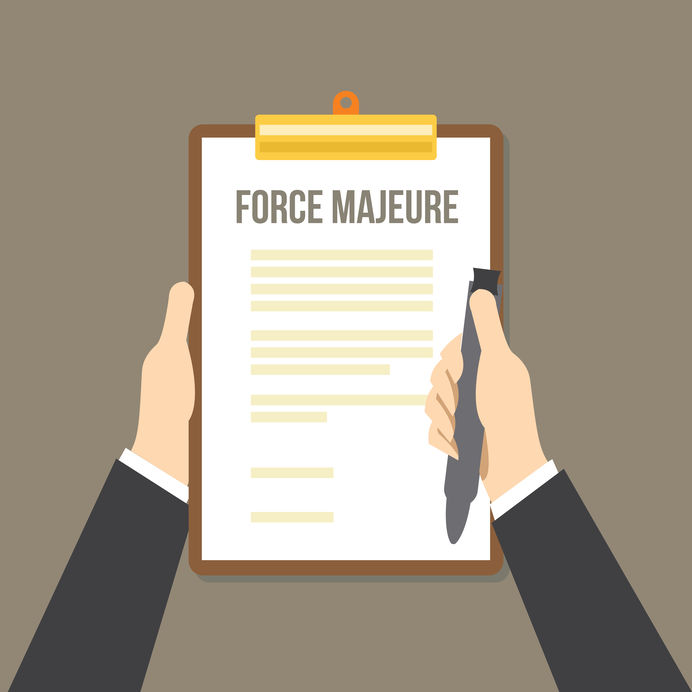As the federal government as well as state and local governments across the U.S. declare varying states of emergencies in response to the COVID-19 pandemic, many industries have been forced to curtail, and even completely cease, business operations, and many workers have been issued “stay home” orders from their employers. These developments have already greatly impacted the U.S. economy, and according to experts, they will likely continue to do so for the foreseeable future as we continue to fight to contain the spread of COVID-19. Due to the forced closure of many “non-essential” businesses, many contractual obligations have been affected due to the resulting workforce and supply shortages. These disruptions have left many wondering whether “force majeure” provisions will relieve them of their contractual obligations. Thus, a review of the concept of force majeure in light of the ongoing developments with COVID-19 is in order.
Force majeure, French for “superior force,” is an unforeseeable and unavoidable event that prevents a party to a contract from fulfilling its contractual obligations. Common examples include war, extreme weather, “acts of God” or natural disasters, labor strikes, and even pandemics. Whether an event constitutes a force majeure, and thereby excuses the non-performance of contractual obligations, is a consideration that must be made on a case-by-case basis. Each contract will dictate which circumstances, if any, qualify as a force majeure, and thus, which circumstances will excuse non-performance of contractual obligations. The purpose of force majeure provisions is to allocate risk between the parties for acts that are unforeseeable and unavoidable, and which make performance of the contract impossible.
When determining whether force majeure can be invoked to excuse non-performance courts look to (a) whether the particular event qualifies as such under the terms of the contract; (b) whether the risk of non-performance was foreseeable and able to be mitigated; and (c) whether the performance is truly impossible, or merely economically difficult or impracticable.
The threshold consideration is whether the event qualifies as a force majeure event under the terms of the contract. This analysis is as simple as looking at the contract itself to see whether acts of that kind are listed as qualifying acts. With regard to COVID-19, the contract in question would need to list “pandemic,” (or a similar indication such as “epidemic,” “disease,” “quarantine,” “state of emergency,” etc.) as a qualified force majeure event. This matter is complicated when the contract employs “catch-all” phrases and fails to specifically enumerate which events trigger force majeure excusable non-performance.
When the threshold consideration is met, the court must then determine whether the party claiming a force majeure event could have foreseen and mitigated its non-performance at the time of contracting. In general, the court will not uphold force majeure non-performance when the event in question is deemed to have been foreseeable at the time of contracting. Whether COVID-19 was foreseeable is likely to be a matter of intense debate. On the one hand, one might argue that pandemics are always inevitable and unforeseeable, while others may argue that the outbreak of diseases such as Ebola, H1N1, SARS, and MERS in recent years shows that pandemics are the new norm, and thus foreseeable, even if they inevitable. It really depends on the contract itself and whether your jurisdiction applies force majeure liberally or conservatively.
Assuming that you’ve met those criteria, the court will finally look at whether performance was truly impossible or merely economically difficult or impracticable. Importantly, the term impossibility means legal impossibility. For example, while it may be physically possible to perform a contractual obligation where a contracting party is hindered by the effects of COVID-19, performance may be legally impossible due to government regulation such as closure of non-essential businesses which would make performance illegal. The court must find that the performance was objectively impossible in upholding force majeure non-performance.
Tips for Businesses affected by COVID-19
If you feel that your contractual performance may be affected due to the COVID-19 pandemic take the following steps to determine whether invoking your force majeure clause is a viable solution:
- Review your contract’s force majeure provision and determine whether COVID-19 may fall into one of the enumerated qualifying events.
- Determine what notice requirements apply to invoking force majeure excusable non-performance. Many contracts provide for specific notice requirements apart from the notice requirements governing the contract, as a whole. Failure to notice the other party(ies) to the contract may act as waiver. Notify the other party(ies) as soon as possible.
- Determine whether there are alternative means of performance available.
- Determine whether performance is truly impossible or if it is merely delayed or economically difficult.
- Document everything. Document when your performance became impossible, what steps you took to mitigate your non-performance, when you provided notice under your contract’s force majeure provision, etc.
- Contact a lawyer specializing in business litigation that can help you see what remedies you have available.








